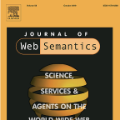We consider a semantic class, weakly-chase-sticky (WChS), and a syntactic subclass, jointly-weakly-sticky (JWS), of Datalog+- programs. Both extend that of weakly-sticky (WS) programs, which appear in our applications to data quality. For WChS programs we propose a practical, polynomial-time query answering algorithm (QAA). We establish that the two classes are closed under magic-sets rewritings. As a consequence, QAA can be applied to the optimized programs. QAA takes as inputs the program (including the query) and semantic information about the "finiteness" of predicate positions. For the syntactic subclasses JWS and WS of WChS, this additional information is computable.
翻译:我们考虑的是数据+程序的语义类、薄弱的聊天-粘性(WCHS)和联合的亚类、联合的粘性(JWS),两者都扩展了我们应用程序中出现的弱粘性(WS)程序,将其扩大到数据质量。对于WCHS程序,我们建议采用实用的、多声时问答解答算法(QAAA),我们确定这两个类在魔术机重写下关闭。因此,QAA可以应用到优化的程序中。QAA将程序(包括查询)和关于上游位置“精度”的语义信息作为投入。对于合成的亚类JWS和WCHS,这种补充信息是可以理解的。
相关内容
- Today (iOS and OS X): widgets for the Today view of Notification Center
- Share (iOS and OS X): post content to web services or share content with others
- Actions (iOS and OS X): app extensions to view or manipulate inside another app
- Photo Editing (iOS): edit a photo or video in Apple's Photos app with extensions from a third-party apps
- Finder Sync (OS X): remote file storage in the Finder with support for Finder content annotation
- Storage Provider (iOS): an interface between files inside an app and other apps on a user's device
- Custom Keyboard (iOS): system-wide alternative keyboards
Source: iOS 8 Extensions: Apple’s Plan for a Powerful App Ecosystem




